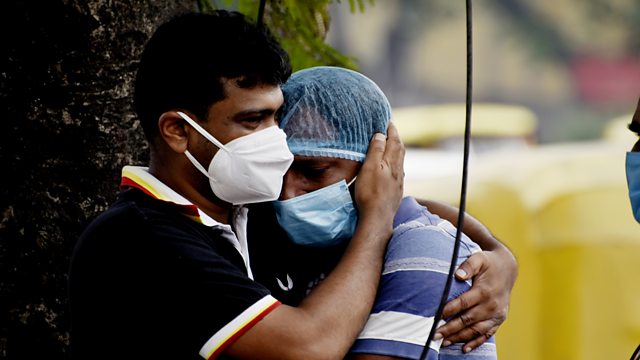
Exponential increase in Indian covid cases
As covid cases surge almost beyond belief in India, how much is to do with social distancing, and how much to do with the mutations to the original virus?
As Covid cases surge almost beyond belief in India, how much is to do with social distancing, and how much to do with the mutations to the original virus?
Ramanan Laxminarayan talks to Roland from Delhi about ways in which the huge second wave could and could not have been predicted and avoided. Suggestions of the latest variant to make the headlines, B1.617, have got virologists such as Ravindra Gupta working hard to identify the clinical significance of the latest combinations of mutations.
In the journal Science, Stephen Chanock of the US Cancer program reports work with colleagues in Ukraine looking at the long footprint of radiation dosing from the Chernobyl nuclear disaster, 35 years ago this week. In the first of two papers, they find a definite footprint of radiation damage accounting for the many sad cases of thyroid cancer in people alive in the region at the time. But in another study, they looked at whether any higher level of mutations could be detected in the germlines of children conceived subsequently to parents who had experienced radiation in the disaster. While the parents' own health is often affected, 35 years on, thus far their offspring show no widespread elevated levels of disease, as was commonly expected.
And in the week that the world witnessed a guilty verdict delivered in the trial for the murder of George Floyd in the US, David Curtis of the University of Utah and colleagues report in the journal PNAS a study that suggests the widespread media coverage of acts of racial violence, including deaths at the hands of police, leads to poorer mental health in Black Americans. As the 大象传媒鈥檚 Samara Linton reports, the study involved google search data over five years up to 2017, and nearly 2.3 million survey respondents.
Also, most of us don鈥檛 like to dwell on our toilet habits, but this week we have gone down the drain to discover what wastewater can tell us about our health.
It鈥檚 been more than a year since scientists across the globe started to track the spread of Covid-19, with help from home test results and hospital data. Marnie Chesterton investigates the latest tool in their arsenal: sewage. Listener Kevin has heard how human waste can be monitored to check for virus levels, and wants to know if it can also be used to stop the disease in its tracks?
Although the coronavirus has been discovered in people鈥檚 poo, so far there鈥檚 little indication it鈥檚 actually being spread through the water system. But by taking regular samples from different parts of cities, authorities are now able to accurately predict a local peak weeks before the population shows signs of sickness, then take immediate measures to alert them. In Detroit we hear how environmental engineer Professor Irene Zagoraraki used this method to detect a rare strain of Herpes which doctors didn鈥檛 even know was a potential problem.
We talk to Professor Nick Thomson from the Wellcome Sanger Institute, who sequenced the genome of the bacteria that causes cholera, to understand how it has crisscrossed the globe. He discovered that the pandemic currently devastating Yemen actually originated in Asia. It鈥檚 a discovery that has changed how the WHO is thinking about this killer disease and could have important implications for vaccination programmes. But our effluent can also pose environmental problems, and Professor Andrew Johnson from the UK鈥檚 Centre for Ecology and Hydrology explains there are now as many as 300,000 chemicals that could threaten natural habitats.
While authorities try to test each one individually, he鈥檚 concerned they may have different effects when they mix in wastewater, and current monitoring systems don鈥檛 take this into account. Not only that, but some of these substances contain silver nanoparticles, which Professor Juliane Filser tells us stick around in soil for ever, threatening organisms and bacteria at the base of the food chain
Image: NurPhoto/Getty Images
Last on
Broadcasts
- Sat 24 Apr 2021 23:06GMT大象传媒 World Service South Asia & East Asia only
- Sun 25 Apr 2021 00:06GMT大象传媒 World Service except East Asia & South Asia
Podcast
-
![]()
Unexpected Elements
The news you know, the science you don't

